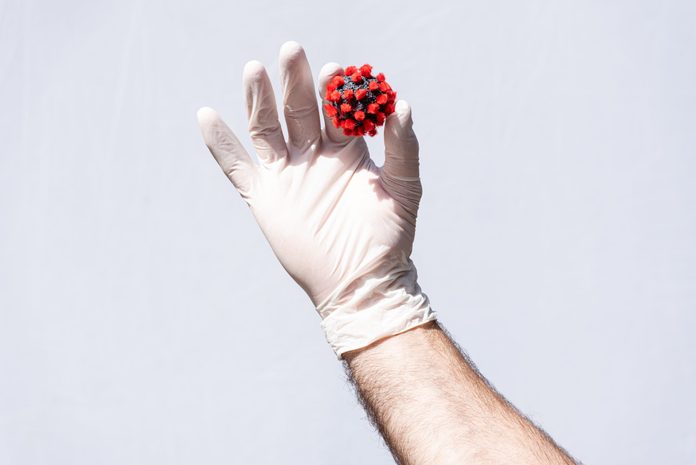
Germs are everywhere
People are more aware of germs and how they spread since the COVID-19 pandemic hit. In general, the more things that you touch on a regular basis, the higher the risk you’ll also pick up bacteria and viruses, says Kristine Arthur, MD, an internist at MemorialCare Orange Coast Medical Center in Fountain Valley, California. “It is nice to share, but not ideal to share germs,” she says. Although it’s sometimes inevitable to transfer germs, especially if you live with other people, it’s still possible to stay healthy and limit their spread if you take some precautions, according to Dr. Arthur. While people tend to be extra cautious about sharing things, there are still items people are sharing that they really shouldn’t be. If you want to keep your friends or family free from excess germs, make sure you aren’t sharing the following items.

Pens
The clipboard pen is one of the filthiest items in your doctor’s office. Since the pandemic started, some doctor’s offices have separated their pens into “dirty” and “clean” cups to limit the spread of germs, but those germs can still find their way to you. Researchers found the clipboard pen has more than 46,000 times more germs than an average toilet seat. That’s why Dr. Arthur doesn’t share or borrow pens provided in public places, especially in your doctor’s office. “Everyone is touching them, and in a place where people are sick they are even more likely to have bacteria or viruses on them,” she says. “Bring your own pen for filling out forms.”

Food
Taking a bite of someone else’s meal may not seem like a big deal if you’re quarantining with them—but not so fast. Even if you’re in the same household as your loved ones, experts say you still shouldn’t share food. “Food is still pretty much shared among people nowadays, especially in small gatherings,” says Jolene Caufield, Senior Advisor at Healthy Howard. “Sharing your food with people is the easiest way to transfer saliva to that other person, making them more prone to catching the virus—especially if you’re asymptomatic.”
Instead of grabbing a bite of someone else’s food, get your own small sample from an untouched source or ask for someone’s opinion on the dish. That way, you get an idea of what the food is like without spreading germs.
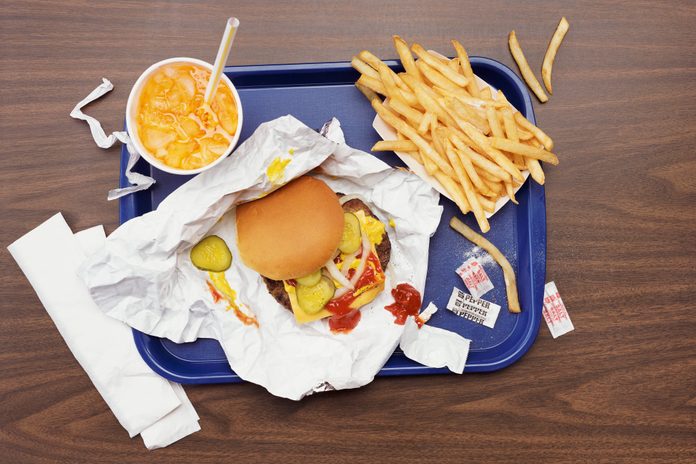
Fast-food trays
Some fast-food restaurants in select locations are open for dine-in services. If you plan on dining at one of these locations, there’s one important thing to be cautious about sharing with others. Once your number is up, and your feast of fries and burgers is ready, you might be quick to grab a tray and chow down. You’re actually getting more than your order if you use the plastic trays at fast-food restaurants. “Not only are they used by everyone, but they are typically only wiped down with a cloth and not thoroughly cleaned with hot water and soap,” Dr. Arthur says. “If you do get your food on them, take it off and put the tray back; never set your food directly on it.” Each location may have its own protocol for cleaning trays, though, so check with the staff if you’re curious how they’re sanitized.
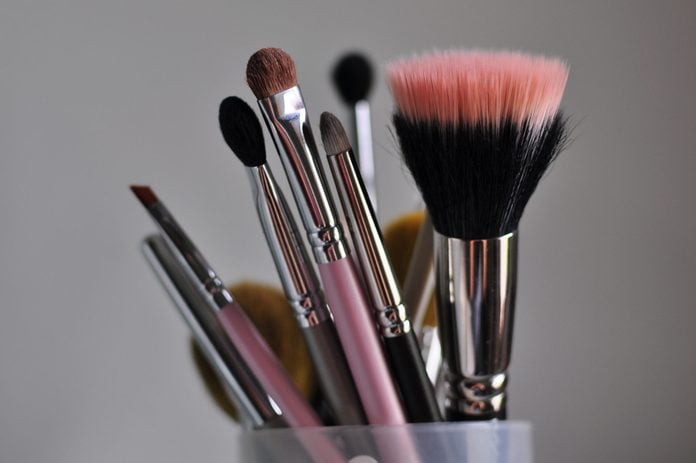
Makeup and makeup brushes
It can be tempting to share makeup with someone in your home, especially if you’re running low and are trying to reduce the number of outings you make. However, sharing makeup can get you sick. Open makeup containers invite bacteria growth. Add in sharing makeup with a friend or family member, and you’re also adding more opportunity for viruses to transfer over, says Julia Blank, MD, a family medicine physician at Providence Saint John’s Health Center in Santa Monica, California. Dr. Blank says sharing eye makeup could result in conjunctivitis, while sharing lip products could make you susceptible to mono, herpes, and strep, according to Dr. Blank. That’s why you should replace your cosmetics frequently and never borrow things like liquid eyeliner, mascara, or lipstick. Learn how to clean makeup brushes effectively.
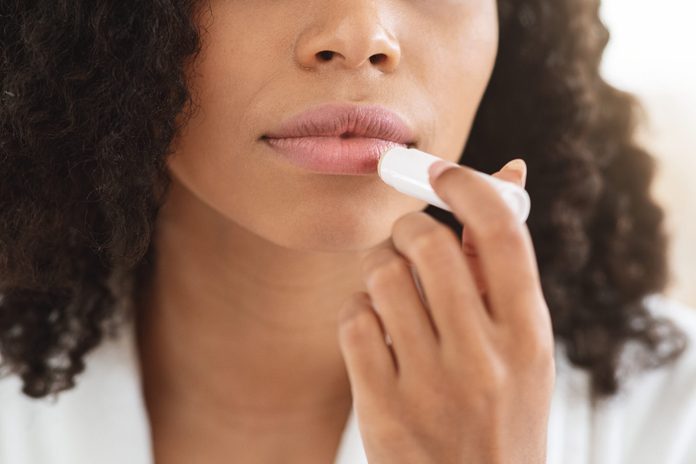
Lip balm
If a loved one has chapped lips, you may be tempted to share your lip balm with them — but it’s not a good idea. There are many reasons not to share something that’s applied directly to your lips. If you share lip balm, you’re increasing your risk of contracting and spreading germs. Think about it: you may frequently lick your lips, or touch your mouth. Saliva droplets can fall on your lips when you talk. If you put lip balm on and share it with a loved one, you’re sharing your germs with them, and vice-versa. Loved ones share a lot of things, but germs shouldn’t be one of them—so keep the lip balm (you make want to try this all-natural lip balm with 50,000 reviews!) to yourself.
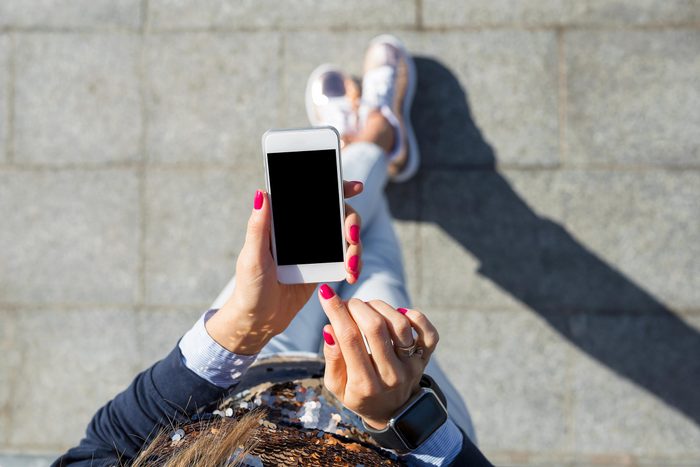
Phones
Try not to share a cellphone or a landline phone as much as possible, Dr. Arthur says. Phones come in close contact with the face and mouth, which is part of the reason why your phone screen is way dirtier than you thought it was. If sharing is necessary, put the phone on speaker, so there’s no skin-to-skin contact.
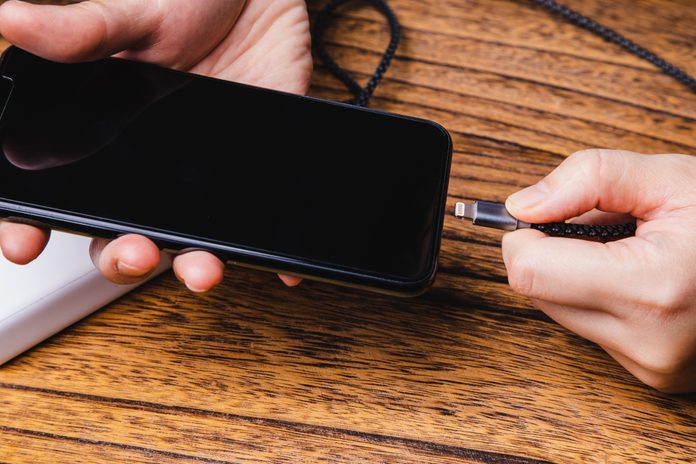
Phone chargers
We’ve all heard the question, “Do you have a phone charger I can borrow?” While you may have good intentions for sharing your phone charger, doing so could have negative consequences for your health. “People do not instinctively sanitize them before using them,” says Stephen Jacob of BestForAndroid. “More, not everyone is knowledgeable about how to do it. In short, electronic devices, as much as possible, should be kept personal because people forget to disinfect them regularly.”

Home offices
The COVID-19 pandemic has shifted the way people work. Some companies are having employees work from home for the foreseeable future, causing many people to set up their own work-from-home stations. If your loved ones are also working from home, you may want to share this space—but doing so could put your health in jeopardy. Viruses and bacteria can spread in a shared home office, especially if you’re sharing office supplies. Try to have your own separate home office set-ups. If you don’t have the space for multiple home office setups, be sure to sanitize your space and limit the supplies you share. Here are 7 reasons you need to clean your laptop ASAP.
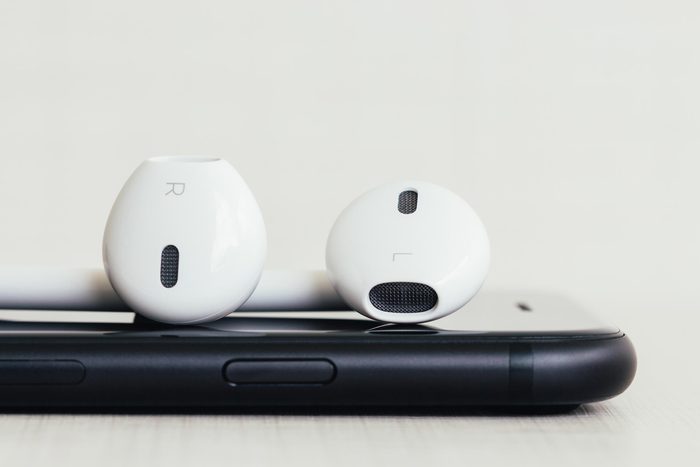
Earbuds
Borrowing headsets may seem innocent enough, especially if you’re sharing a work-from-home space with your family. If you need earbuds, you may be tempted to snag them from family members. However, you really shouldn’t share earbuds with anyone. Although earwax is natural ear protection, earphones trap the once-innocent bacteria in the wax. Any wax building up on earphones traps and grows this bacteria, which could lead to infections. Plus, sharing earbuds can spread viruses to others. Regularly clean your earbuds and put your phone on speaker to share tunes with a friend.
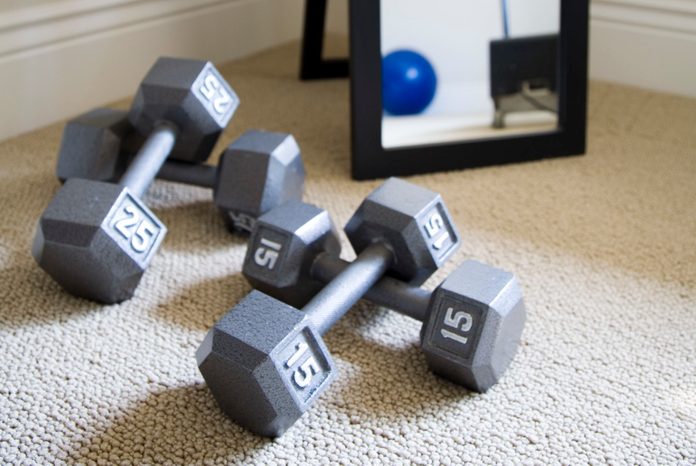
Home weights
The pandemic shifted a lot of things for people, including the way they exercise. Many people began working out at home and bought at-home weights to keep up with their exercise routine. While the convenience of an at-home workout space is great for your physical health, it could harm your overall health if you’re sharing home weights with others.
Home weights may be used by multiple people in your home, which means lots of germs are living on their surfaces. If you don’t properly clean them after a workout, you risk being exposed to germs and spreading them. If you can, get multiple sets of home weights to limit the chance of transmission. You should also properly sanitize your home weights before and after each workout to help limit the spread of germs.
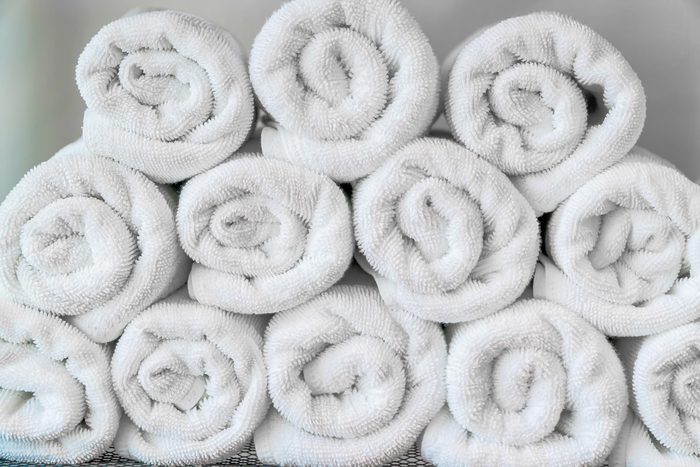
Towels
Towels welcome bacteria since they are typically damp and absorbent, which is why you shouldn’t share them, according to Dr. Arthur. Some bacteria can survive for hours on wet surfaces, and fungus loves damp towels, Dr. Blank adds. It doesn’t help that people also usually wash their hands incorrectly, Dr. Blank says, leaving bacteria and viruses on the skin. These germs transfer to the hand towel and ultimately the next person who dries their hands. To stop this cycle in its tracks, opt for fancy paper hand towels that are more sanitary, Dr. Arthur says. No one wants to share a damp, used towel. Here’s how often you should be washing dish towels.
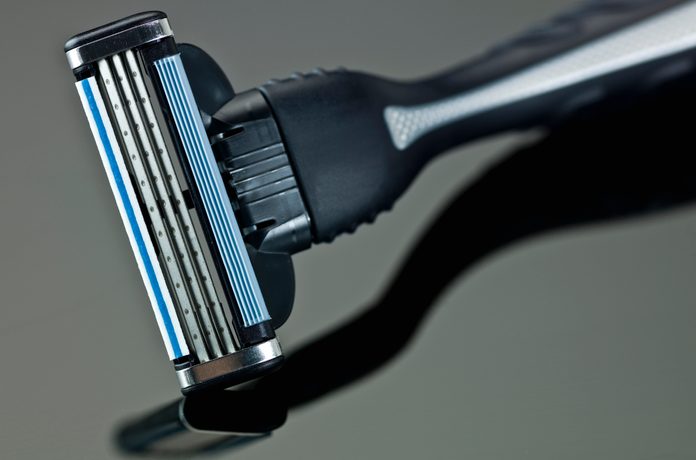
Razors
Nicking yourself in the shower is more common than not, hence why Dr. Arthur and Dr. Blank both say not to share these blades. Even borrowing someone’s razor for a quick touch-up could be bad. Not only can sharing razors spread bacteria and viruses, but it could also spread more serious blood-borne pathogens like hepatitis B and C, Dr. Arthur and Dr. Blank say.
A good rule of thumb is to keep personal items to yourself, according to Dr. Anna H. Chacon, MD FAAD. “If you lend out these personal items to others, you may end up with an upper respiratory infection, a superficial skin infection, or other symptoms,” says Dr. Chacon. “It is simply better for each to use their own personal care item to avoid this.”
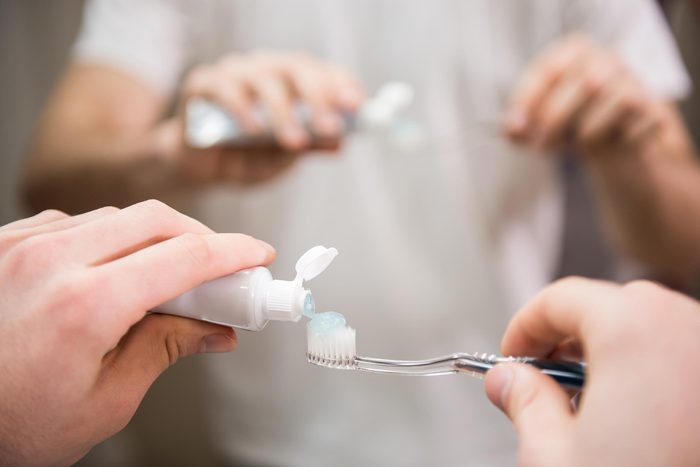
Toothbrushes
The human mouth is a wonderful breeding ground for all sorts of bacteria and viruses, according to Dr. Blank. That’s why she doesn’t share her toothbrush. “Infectious microorganisms get deposited on wet toothbrush bristles, and can be transmitted to anyone who uses that toothbrush,” Dr. Blank says. The worst-case scenario? Someone with a weak immune system uses a contaminated toothbrush and develops a potentially life-threatening infection, according to Dr. Blank.
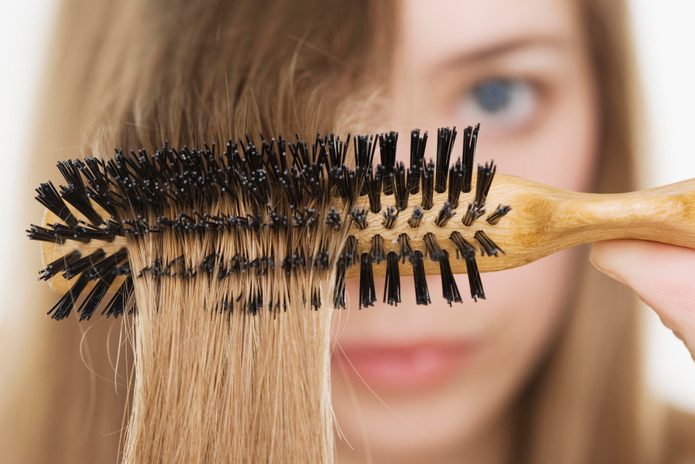
Hairbrushes
Everything from dust mites and oils to dead skin cells is on your brush, so you might want to keep yours to yourself. Let the worst-case scenario—lice—be a warning to clean and not share brushes with anyone. If you do get lice, it easily spreads to other things like bed sheets or the couch after it reaches your hair, according to the CDC. Harmful viruses and bacteria can also live on your brushes’ handles. To avoid transferring harmful germs, clean your brushes with antibacterial soap frequently and avoid sharing them as much as possible.
Dr. Chacon says a good tip to help limit the spread is to stock up on personal items. “To avoid even risking the need to share them, I often just purchase multiple and make sure that I keep an extra item in my car, suitcase, office, or purse—wherever I spend the most time.”
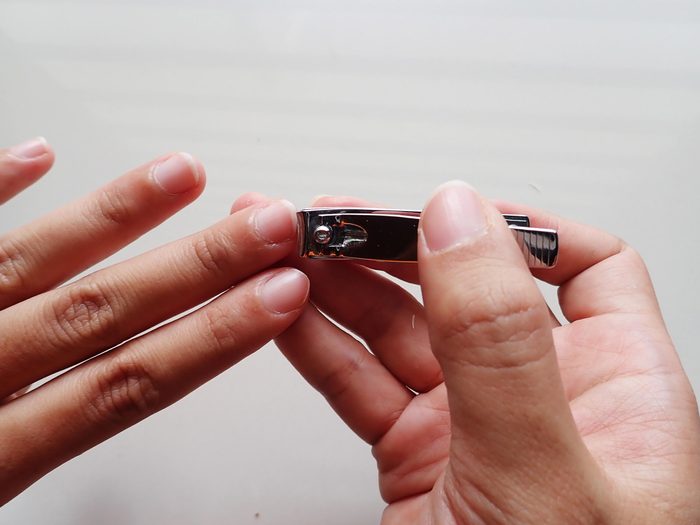
Nail clippers
Most people don’t regularly clean their nail clippers and also share them casually with friends and or family. Similar to razors, this could be a dangerous habit because sharing items that could come into contact with another person’s blood is one way to spread harmful viruses and bacteria. Plus, you never know what someone else touched before they touched your nail clippers. They could unknowingly spread germs that get others sick or even cause a fungal infection. Learn what the color of your nails says about your health.
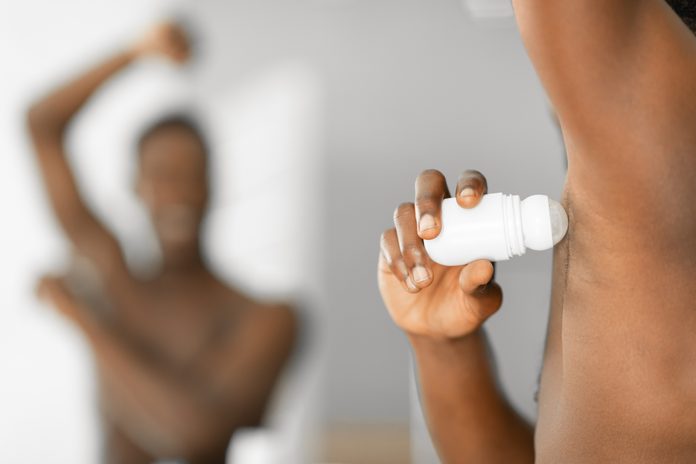
Antiperspirant
Swapping germs from one armpit to another is as easy as borrowing someone’s antiperspirant. Deodorants, however, are less risky when it comes to sharing because they usually have an alcohol base. The alcohol makes your skin acidic and less attractive to bacteria, according to Mayo Clinic. Antiperspirants are another story since they typically have aluminum which exclusively blocks sweat pores, not bacteria. Your antiperspirant is also one of the germiest things you’ll find in your home.
![hands closeup men washing hands with alcohol gel or antibacterial soap sanitizer. Hygiene concept. prevent the spread of germs and bacteria and avoid infections corona virus [Covid-19]](https://www.rd.com/wp-content/uploads/2021/03/GettyImages-1216199296.jpg?fit=696%2C464)
Hand sanitizer
Hand sanitizer has become part of our everyday lives amid the COVID-19 pandemic. While using hand sanitizer is encouraged, sharing hand sanitizer should be avoided. If people are handing a bottle of hand sanitizer to one another, there’s a chance viruses and bacteria could spread. Sure, your hands are sanitized, but the bottle won’t be unless you take measures to properly sanitize it after each person uses it. If you are going to share hand sanitizer with someone, have them hold their hands out and drop the sanitizer into their hands—don’t hand them the bottle.
Sources:
- Kristine Arthur, MD, internist at Memorial Care Orange Coast Medical Center in Fountain Valley, California
- Jolene Caufield, Senior Advisor at Healthy Howard
- Julia Blank, MD, family medicine physician at Providence Saint John’s Health Center in Santa Monica, California
- Stephen Jacob, editor, bestandroid.com
- Dr. Anna H. Chacon, MD FAAD, Expert Medical Writer for ZELEN Life blog
- CDC FAQs on head lice
- Mayoclinic.org
